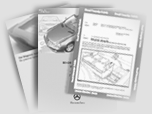
Diagnostic Manual, Body and Accessories,
Volume 1.1
Diagnosis - Diagnostic Trouble Code (DTC) Memory (PSE)
Preparation for Test
1. Connect impulse counter scan tool or Hand-Held Tester (HHT) to X11/4, according to diagram, see section 0.
Notes:
1. Read out Diagnostic Trouble Codes (DTC's) and record.
2. Rectify faults according to table.
3. Interrupt voltage to PSE control module for approx. 3 seconds,
to erase the safety memory.
Electrical wiring diagrams
See Electrical Troubleshooting Manual, Model 140.
|
 |
DTC
 |
 |
Possible cause |
Test step/Remedy 1) |
 |
   |
No malfunction in memory. |
- |
 |
   |
Central locking system or remote trunk release, air demand too high. |
 32 PSE/CLor 32 PSE/CLor  32 PSE/RTR 32 PSE/RTR |
 |
   |
Retractable trunk lid grip or lock striker actuator 2), air demand too high. |
 32 PSE/RTG 32 PSE/RTG |
 |
   |
Backup assist, air demand too high. |
 32 PSE/BA 32 PSE/BA |
 |
   |
Orthopedic seat backrest pressure, air demand too high. |
 32 PSE/OSB 32 PSE/OSB |
 |
   |
Manifold vacuum assist and/or retractable rear head restraints,
air demand too high. |
 32 PSE/MVA or 32 PSE/MVA or
 32 PSE/RHR 32 PSE/RHR |
 |
   |
Lock switch circuit 1, signal fault. |
 23 PSE/CL 23 PSE/CL  2.0, 3.0, 4.0 2.0, 3.0, 4.0 |
 |
   |
Lock switch circuit 2, signal fault. |
 23 PSE/CL 23 PSE/CL  2.0, 3.0, 4.0 2.0, 3.0, 4.0 |
 |
   |
Rear head restraint retraction signal fault. |
 23 PSE/RHR 23 PSE/RHR  1.0 1.0 |
  |
   |
Central locking interior control switch signal fault. |
 23 PSE/CL 23 PSE/CL  1.0 1.0 |
  |
   |
Front door switch signal fault. |
 23 PSE/CL 23 PSE/CL  5.0 5.0 |
  |
   |
Lock switch circuit 1 signal is present for longer than 2 minutes. |
 23 PSE/CL 23 PSE/CL  2.0, 3.0, 4.0 2.0, 3.0, 4.0 |
  |
   |
Lock switch circuit 2 signal is present for longer than 2 minutes. |
 23 PSE/CL 23 PSE/CL  2.0, 3.0, 4.0 2.0, 3.0, 4.0 |
  |
   |
Central locking interior control switch signal is present
for longer than 2 minutes. |
 23 PSE/CL 23 PSE/CL  1.0 1.0 |
  |
   |
Rear head restraint retraction signal is present for longer than 2 minutes. |
 23 PSE/RHR 23 PSE/RHR  1.0 1.0 |
1) Observe Preparation for Test, see  22. 22.
2) As of chassis end number 118 121 |
|


 Printable version
Printable version








 32 PSE/CL
32 PSE/CL




 2.0
2.0
